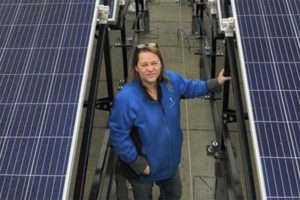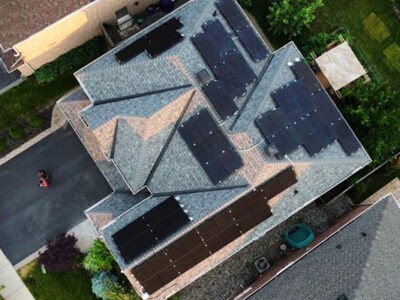- Some companies are taking advantage of the current "Canada Greener Homes Grant" to sell homeowners on projects using misleading pitches.
- Steps must be taken to keep Canadians safe and prevent situations like the Pink Energy fiasco. While the unfortunate case happened south of the border, the Better Business Bureau now reports that solar scams are becoming more common in Canada.
- We reached out to some industry execs to get their take on this, and we also suggest what the government can do to remedy the situation before the chaotic days of the microFIT reoccur.
The solar boom has brought challenges and unintended consequences to Canadian homeowners interested in adopting the technology.
Cold-calling and door-to-door solar sales are becoming more common across Canada. Some companies are taking advantage of the current grants to sell homeowners on projects using misleading pitches. The Better Business Bureau has reported an increase in solar scams, including callers phishing for banking information.
Steps need to be taken now to keep Canadians safe and prevent situations like the most recent now closed Pink Energy fiasco in the U.S.
A customer’s worst nightmare
A lot can be learned from the above-mentioned Pink Energy debacle. Customers complained of pushy sales tactics that misled them into purchasing solar systems that failed to save them money.
According to former Pink Energy customers, they were also promised that the majority of their solar system costs would be reimbursed by federal tax credits. It was too late when customers discovered they had been misled and were ineligible to receive federal tax credits.
Pink Energy customers were left scrambling to pay for electricity on top of the pricy loan payments they took out for solar panels.
This story isn’t unique to the U.S.; this also happened (especially during the microFIT days) and continues to happen in Canada.
When homeowners consider investing in a residential solar system, one of their first questions is, “Can I afford it?” Especially now, with rising inflation rates — many Canadians are stretched thin. Homeowners need to trust that the information they’re getting about major purchases is reliable. Solar systems are no exception.
“Licensed” might not mean what you think

People who use this sales approach are often known as traveling salesmen, and the technique is also sometimes called direct sales.
If a solar company is licensed, its salespeople must also be licensed in the states. Otherwise, they risk breaking the law. Whereas in Canada, solar salespeople do not require any certification. In addition, any licensed electrician in Canada can claim they’re qualified to install solar panels even though they could be lacking the experience and training necessary to install your solar system effectively.
Being licensed as an electrician is different than being licensed to install solar systems.
Many U.S. states require solar installers to obtain a separate, specialized solar contractor’s license. This is not the case in Canada, which means the onus is on homeowners to find and hire an experienced solar company.
It can be tricky to sort through options for solar installers
Recently, I was curious to see if there were any updates on solar grants in Canada, so I did a quick search on google. I was bombarded with sponsored ads like: “solar grants Canada” and decided to do some digging.
Looking into a few pages, I noticed solar companies making it seem like the “Canada Greener Homes Grant” is an exclusive rebate their business offers. This can be misleading to homeowners, as it makes it seem like you might miss out on funding if you go with a different solar company.
Misleading marketing tactics
Another commonly used marketing tactic I noticed was a pop-up contact grab. Solar companies promise to help prospective buyers learn whether or not their home qualifies for the Canada Greener Homes Grant, if they simply fill in their contact information.
Meanwhile, the eligibility information for the grant is all readily available on the Government of Canada’s website. With solar scams on the rise, it’s vital customers do their research and look into the credibility of a solar energy company before providing any sensitive information.
Solar scams on the rise
According to the Better Business Bureau, solar scams are becoming more common in Canada. In many cases, a representative (pretending to work for a solar company) contacts homeowners with the claim of being able to install solar panels at a very low cost or according to some reports, at no cost to the homeowner at all. From there, the scammer obtains banking details under the guise of needing to verify if the homeowner qualifies for reimbursement.
Also reported on the BBB’s scam tracker, a homeowner was approached by a door-to-door salesperson who claimed they could get them a new roof and solar equipment with a government rebate of 26% off the cost. They were told the rebate would fully cover the new roof. After doing their research, the homeowner discovered that while the government program did exist, the pushy salesperson was misrepresenting information to make a sale.
Due to a rise in high-pressure tactics and solar scams, the “Canada Greener Homes Grant” main page now bears the following warning:
“Be wary of high-pressure sales tactics that claim to have ENERGY STAR® or Natural Resources Canada (NRCan) backing. NRCan has not approved any third parties to make unsolicited contact with homeowners to register or participate in the Canada Greener Homes Grant. The Government of Canada, NRCan and its family of brands (ENERGY STAR, EnerGuide) never solicit over the telephone, or by email or go door-to-door asking to enter Canadians’ homes to inspect, sell, or rent heating and cooling products.”
We can learn from the demise of Pink Energy
In response to allegations about Pink Energy’s salespeople misleading customers with inaccurate information, the CEO explained that his salesforce used to be paid on commission but later on switched to salary, but the damage had been done.
Is the commission-based pay structure to blame?

Jayson Waller is the CEO of Power Home Solar, which does business as Pink Energy. (Milwaukee Business Journal)
The Pink Energy situation exposes the ethical concern of whether or not salespeople in the residential solar space should ever be primarily paid on commission. When it comes to residential solar, while it’s a solution to meet global, regional and local carbon reduction goals, it’s also a major investment for homeowners.
Canadians interested in investing in solar need to trust that when they’re trying to determine whether a residential solar solution is financially possible, the information they’re getting is honest and accurate. It should be a given that a residential solar system will be designed effectively and installed properly. However, not every solar system ends up being capable of reliably meeting a household’s energy needs for decades to come.
Commission-based residential solar sales are becoming more common coast to coast
In a conversation with James Rendle, one of the directors of Wattsup Solar LTD, he explained that all salespeople at their company are paid a salary, despite their two largest competitors in Nova Scotia opting for a commission sales structure.
“If someone is paid a commission sales structure, their incentive is always to maximize the number of panels sold or the size of the system sold. However, there are many places on a roof where panels can be placed in a suboptimal position. Since solar in Nova Scotia is completely unregulated, a salesperson could recommend a north facing roof, a shaded roof, or a terrible value proposition because they are self interested. I often say that our competitors will put panels on the doghouse if they can convince you it’s a good idea.”
By paying a salary, Wattsup is able to ensure its sales team has the customer’s best interests in mind.
According to Rendle, it’s unfortunate that “many salespeople view solar as a unique model because you have no repeat business. If a customer is unsatisfied, it doesn’t matter because it’s not like they will ever have a need to buy a solar system again.”
This mindset of not having to worry about whether a customer is satisfied with their solar installation is problematic value for a salesforce to embody.
I also spoke with Greg Sauer, SkyFire Energy’s VP of Sales and Employee Owner. We discussed how commission-based residential solar sales have emerged in Alberta since the solar boom.
“In the past year, interest in solar PV has exploded in Alberta to the point where many of the original installers have been challenged to meet the inbound requests from our referral networks and web-based leads. Others have embraced a business model based on rapid growth and/or taking advantage of grants and incentives—get em while they last if you will. These organizations are taking a page out of the US playbook and electing to employ door knockers and closers internally or to work with outside organizations who sell these services.”
In terms of sales tactics, according to Sauer, some of these emerging companies with a rapid growth business model attempt to appeal to the emotions of homeowners. “These organizations and individuals often rely on the prospect’s “pain” (e.g. a costly electricity bill) to sell their product or service, with lines such as “you do not rent your home, why would you rent your energy?” or “you would be foolish not to install solar now, the government is giving away cash and these systems will easily cash-flow on a monthly basis.”
Sauer’s advice for homeowners considering solar is to do their research before committing to anything:
“I would urge anyone approached by a door knocker with a tablet and a slick presentation to take their time and to do their due diligence. Search online reviews and obtain a second quote from someone with longer tenure (e.g. +5 years) working in Alberta. If possible, obtain a referral from someone that you respect.”
He also cautions homeowners to be wary of door-to-door salespeople in the residential solar space and to always ask whether the individual works directly for the installer or if they represent a third-party organization.
As the Pink Energy situation illustrated, ineffective solar systems could put homeowners under considerable financial strain. To prevent this, residential solar salespeople should not be driven to make a sale to get paid. Paying residential solar employees a salary is one way to remove the potential incentive to make the sale by any means necessary.
However, it’s not the only viable approach to ensure homeowners receive information they can trust.
It’s not as simple as commission pay-structures are solely to blame
A Solar company’s values and proven industry experience matter more than the pay structure of its salespeople.
It’s a better indicator of a company’s ties to its community and their commitment to servicing the systems they install for years to come. Not every commission-based pay structure incentivizes salespeople to champion a massive or awkwardly placed system that may not offer the best return on investment.

Lorena Mitchell, owner of Evolve Green, says there is now an expedited process for solar projects in Winnipeg, which will help streamline the process a bit more. (Evolve Green)
In a discussion with Lorena Mitchell, President of Evolve Green and Chair of the Manitoba Sustainable Energy Association, she describes how her company utilizes a commission-based sales structure for their salespeople but maintains a focus on designing load-shaving solar systems that can offer a good return on investment.
“Our Salespeople are commission only, but we focus on return on investment for our customers. So, we call it load-shaving, and we get upwards of 9-13% return on investment yearly for our customers. It’s not the most panels you can get on a roof; it’s the most efficient panels you can get on there.”
In her experience, Mitchell says she has previously talked homeowners out of panels for the client to get the best return on investment for their solar project.
According to Mitchell, Evolve Green sees many repeat customers happy with their initial solar system and decide to add one to their cottage or small businesses. Also, when customers sell their homes and move somewhere new, if they are happy with their solar provider, they’re likely to return to them to install a system on their new home.
Customer referrals can be a significant source of leads for a solar company. Therefore, thinking about solar as an industry without the potential for repeat business is disastrous, especially when Canada’s climate goals require the technology to become widespread in residential areas across the country.
Mitchell’s advice to homeowners considering residential solar is to:
“Do your research; look around. There is information on each of these companies out there. You want to get a minimum of 2-3 quotes. Don’t just go with a flashy salesperson. Search the Better Business Bureau, and search Facebook. Look at the worst review and see how the company handled it. No company is perfect, which is why the negative reviews are so telling. It might not be possible to find a long-standing solar company with all five-star reviews, but it could be possible to find a company with high reviews that provided unhappy customers with a solution to their complaints.”
Knowing a regulatory body exists to certify solar installers would be the most useful to homeowners when trying to research solar companies. This would ensure homeowners know the provider they were going with has at least completed solar-specific training.
Solar installers should be licensed and overseen by a governing body

Canadian government official announcing the launch of the first phase of the new Canada Greener Homes Loan for homeowners, which will provide interest-free loans of up to $40,000 per household.
On the provincial level, a governing body should be created to oversee solar energy companies and ensure sufficient training has been completed before said can advertise themselves as licensed or certified to install solar. Otherwise, when solar installers advertise themselves as licensed, they could be referring to being a licensed electrician who may or may not have completed additional training to install solar systems.
The issue of regulating licensing and training for solar installation has been handled differently across the U.S.
How is it done elsewhere?
In California, for example, the Contractors State License Board (CSLB), which is the governing body for all contractors in the state, issues a separate license (the C-46) that is required for all persons in the state of California intending to bid on solar panel installation or repair projects that exceed $500 in labor and material costs.
In order to obtain a C-46 license, an applicant will be tested on all aspects of installing and repairing solar energy systems. The comprehensive exam covers planning and estimating, solar collector installation, solar thermal installation, photovoltaic (PV) system installation, commissioning, service and maintenance, and safety. To qualify, applicants must also prove they have a minimum of 4 years of relevant experience.
Governing bodies like the CSLB are responsible for protecting the consumer public by ensuring that any person providing construction and repair services on solar systems is qualified and registered with the state. They administer licensing exams and maintain a database of all active and inactive contractor license numbers that are available on the public domain.
Having a database like this for Canadian provinces would be a tremendous help for homeowners trying to determine which solar company to work with on their residential solar project.
If homeowners are expected to adopt solar, Governments need to do more
Creating a license or certification program for solar systems, overseen by a governing body, would help keep Canadian consumers stay safe from predatory solar scams. A governing body would ensure certain standards are met before someone could legally advertise themselves as licensed or certified to install or repair solar systems.
If you’re surprised a Canadian governing body overseeing solar doesn’t already exist, you’re not alone.
If Canada is to stand a chance at meeting its net-zero goals and growing energy demands, homeowners are expected to adopt residential solar.
It follows that governing bodies should be created at the provincial level to oversee or “police” the solar industry. Canadians deserve reliable services from qualified solar installers and trustworthy information from knowledgeable salespeople.













Comments